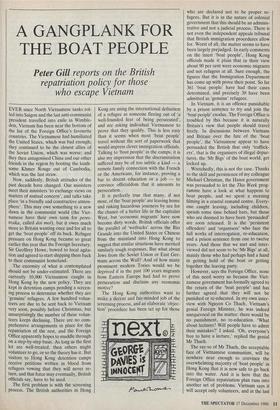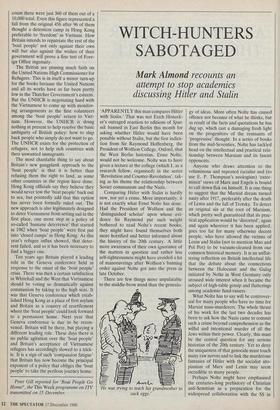A GANGPLANK FOR THE BOAT PEOPLE
Peter Gill reports on the British
repatriation policy for those who escape Vietnam
EVER since North Vietnamese tanks rol- led into Saigon and the last anti-communist president travelled into exile in Wimble- don, Vietnam has been near the bottom of the list of the Foreign Office's favourite countries. The Vietnamese had humiliated the United States, which was bad enough; they continued to be the closest allies of the Soviet Union, which was worse; and they then antagonised China and our other friends in the region 1:)y booting the loath- some Khmer Rouge out of Cambodia, which was the last straw.
Now, suddenly, British attitudes of the past decade have changed. Our ministers meet their ministers `to exchange views on matters of mutual concern', and talks take place 'in a friendly and constructive atmos- phere'. This may owe something to a new dawn in the communist world (the Viet- namese have their own term for peres- troika, called doi mai), but it owes much more to Britain wanting once and for all to get the 'boat people' off its back. Refugee pressure on Hong Kong became so great earlier this year that the Foreign Secretary, Sir Geoffrey Howe, bowed to local agita- tion and agreed to start shipping them back to their communist homeland.
The enormity of what is contemplated should not be under-estimated. There are currently 10,000 Vietnamese caught in Hong Kong by the new policy. They are kept in detention camps pending a screen- ing process to determine whether they are 'genuine' refugees. A few hundred volun- teers are due to be sent back to Vietnam very soon, possibly before Christmas, but unsurprisingly the number of these volun- teers keeps declining. There are no com- prehensive arrangements in place for the repatriation of the rest, and the Foreign Office apparently hopes to muddle through on a step-by-step basis. As long as the first lot are well-treated, then others might volunteer to go, or so the theory has it. But visitors to Hong Kong detention camps receive petitions written in blood from refugees vowing that they will never re- turn, and that force may eventually, British officials say, have to be used.
The first problem is with the screening process. The British authorities in Hong Kong are using the international definition of .a refugee as someone fleeing out of 'a well-founded fear of being persecuted', and are asking individual Vietnamese to prove that they qualify. This is less easy than it seems when most 'boat people' travel without the sort of paperwork that would impress clever immigration officials. Talking to 'boat people' in the camps, it is also my impression that the discrimination suffered may be of too subtle a kind — a remote family connection with the French or the Americans, for instance, proving a bar to decent education or a job — to convince officialdom that it amounts to persecution.
It is perfectly true that many, if not most, of the 'boat people' are leaving home and risking hazardous journeys by sea for the chance of a better life in the capitalist West, but 'economic migrants' have now become dirty words. British officials offer the parallel of 'wetbacks' across the Rio Grande into the United States or Chinese from the mainland into Hong Kong to suggest that similar situations have merited similarly tough responses. But what about Jews from the Soviet Union or East Ger- mans across the Wall? And of how many prominent modern Tories would we be deprived if in the past 100 years migrants from Eastern Europe had had to prove persecution and disclaim any economic motive?
The Hong Kong authorities want to make a decent and fair-minded job of the screening process, and an elaborate 'objec- tion' procedure has been set up for those who are declared not to be proper re- fugees. But it is in the nature of colonial government that this should be an adminis- trative and not a judicial process. There is not even the independent appeals tribunal that British immigration procedures allow for. Worst of all, the matter seems to have been largely prejudged. In early comments on the latest 'boat people', Hong Kong officials made it plain that in their view about 90 per cent were economic migrants and not refugees at all. Sure enough, the figures that the Immigration Department has come up with prove their point. So far 361 'boat people' have had their cases determined, and precisely 30 have been admitted as 'genuine' refugees.
In Vietnam, it is an offence punishable by a prison sentence to try and join the 'boat people' exodus. The Foreign Office is troubled by this because it is naturally Britain's view that people should travel freely. In discussions between Vietnam and Britain over the fate of the 'boat people', the Vietnamese appear to have persuaded the British that only 'traffick- ers', that is the organisers of illegal depar- tures, the `Mr Bigs' of the boat world, get locked up.
Wretchedly, this is not the case. Thanks to the skill and persistence of my colleague Michael Chrisman, the Hanoi government was persuaded to let the This Week prog- ramme have a look at what happens to boat people, and we spent a morning filming in a coastal remand centre. Every- one caught leaving, including children, spends some time behind bars, but those who are deemed to have been 'persuaded' are soon released. It is the 'persistent offenders' and 'organisers' who face the full works of interrogation, re-education, and a prison sentence from one to twelve years. And those that we met and inter- viewed did not seem to be `Mr Bigs' at all, mainly those who had perhaps had a hand in getting hold of the boat or getting together the leaving party.
However, says the Foreign Office, none of this need worry us because the Viet- namese government has formally agreed to the return of the 'boat people' and has further agreed that they will not be punished or re-educated. In my own inter- view with Nguyen Co Thach, Vietnam's genial Foreign Minister, he was indeed unequivocal on the matter: there would be no punishment, no re-education. 'What about lectures? Will people have to admit their mistakes?' I asked. 'Oh, everyone's free to have a lecture,' replied the genial Mr Thach.
The say-so of Mr Thach, the acceptable face of Vietnamese communism, will be nowhere near enough to convince the overwhelming majority of 'boat people' in Hong Kong that it is now safe to go back into the water. And it is here that the Foreign Office repatriation plan runs into another set of problems. Vietnam says it will accept only volunteers, and at the last count there were just 360 of them out of a 10,000 total. Even this figure represented a fall from the original 456 after 96 of them thought a detention camp in Hong Kong preferable to 'freedom' in Vietnam. How Britain intends to repatriate the rest of the 'boat people' not only against their own will but also against the wishes of their government will prove a fine test of Fore- ign Office ingenuity.
The British are pinning much faith on the United Nations High Commissioner for Refugees. This is in itself a minor turn-up for the books because the United Nations and all its works have so far been pretty low in the Thatcher Government's esteem. But the UNHCR is negotiating hard with the Vietnamese to come up with monitor- ing arrangements as the first volunteers among the `boat people' return to Viet- nam. However, the UNHCR is doing nothing at present to help resolve the basic ambiguity of British policy: how to ship back people who simply do not want to go. The UNHCR exists for the protection of refugees, not to help rich countries with their unwanted immigrants.
The most charitable thing to say about Britain's new gangplank approach to the `boat people' is that it is better than refusing them the right to land, as some other countries in the region have done. Hong Kong officials say they believe they would never tow the `boat people' back out to sea, but pointedly add that this option has never been formally ruled out. The new approach is also legitimately designed to deter Vietnamese from setting sail in the first place, one more step in a policy of so-called 'humane deterrence' that started in 1982 when 'boat people' were first put into 'closed camps' in Hong Kong. As this year's refugee influx showed, that deter- rent failed, and so it has been necessary to find a bigger one.
Ten years ago Britain played a leading role in the Geneva conference held in response to the onset of the `boat people' crisis. There was then a certain satisfaction in Whitehall and the West that Vietnamese should be voting so dramatically against communism by taking to the high seas. It was that Geneva conference which estab- lished Hong Kong as a place of first asylum and Britain as a country of resettlement where the `boat people' could look forward to a permanent home. Next year that Geneva conference is due to be recon- vened. Britain will be there, but playing a different leading role. These days there is no public agitation over the `boat people' and Britain's acceptance of Vietnamese refugees has accordingly slowed to a trick- le. It is a sign of such 'compassion fatigue' that Britain has now become the principal exponent of a policy that obliges the `boat people' to take the perilous journey home.
Peter Gill reported for 'Boat People Go Home!', the This Week programme on ITV transmitted on 15 December.



























































 Previous page
Previous page